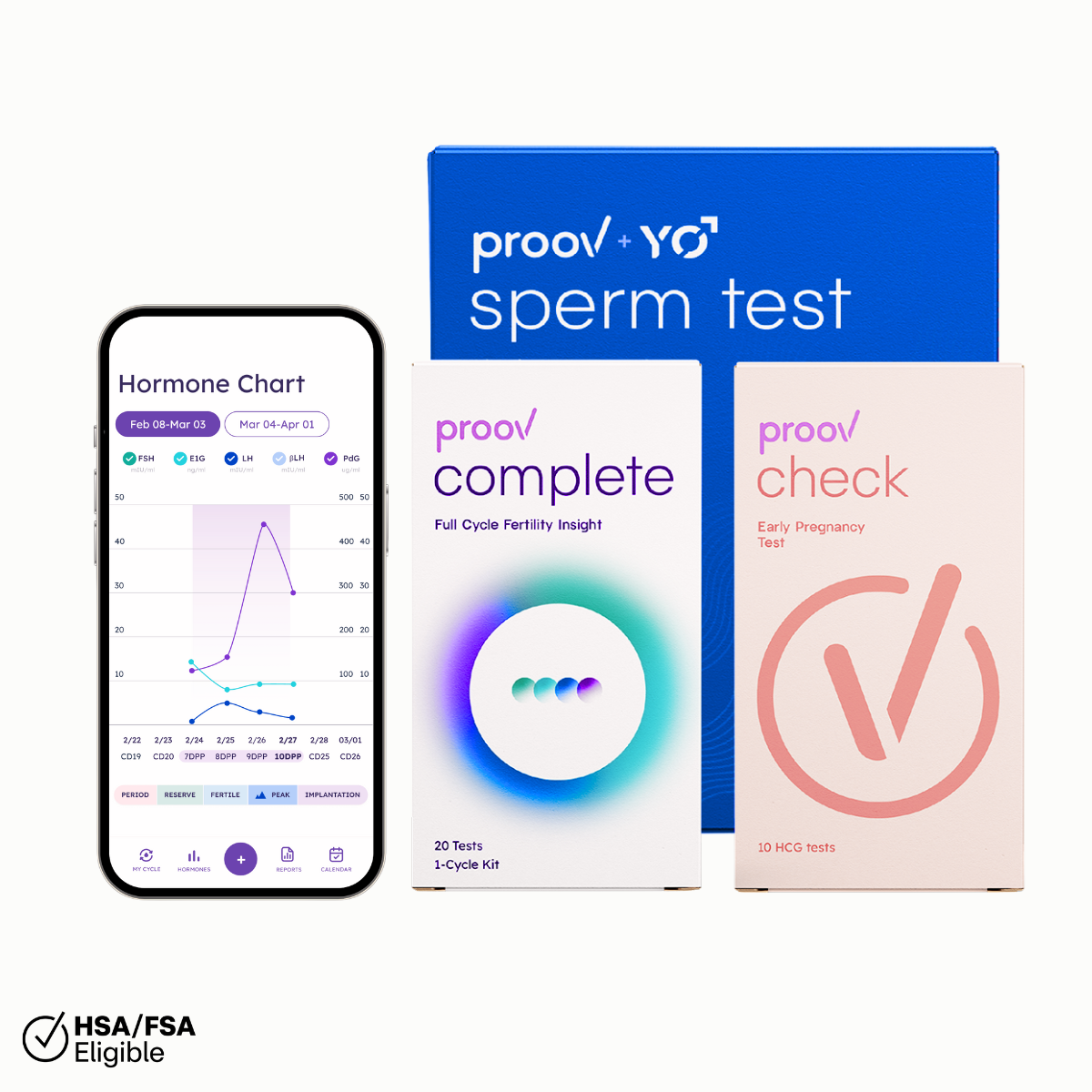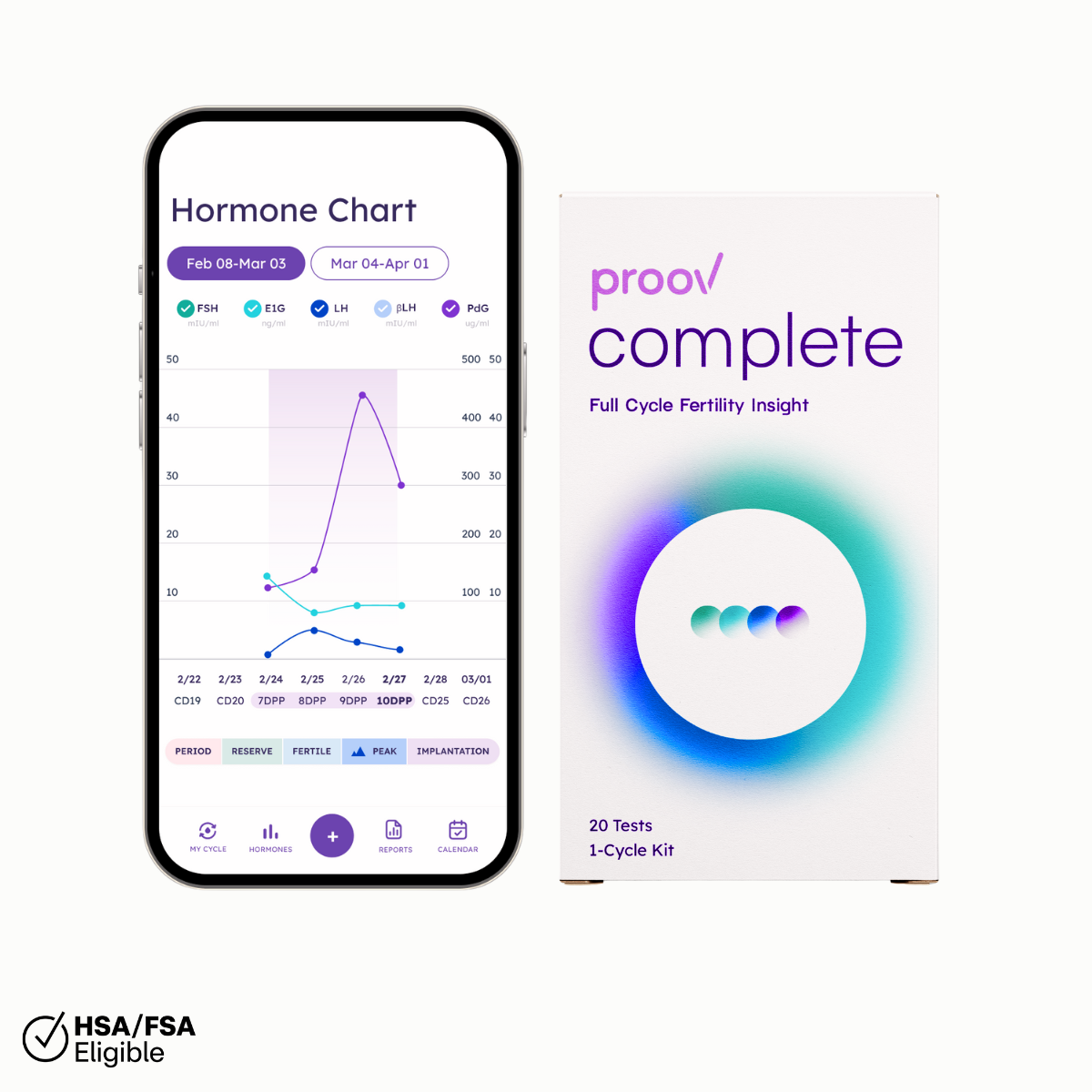Written by: Audrey Livingston, Proov Marketing Manager

Marketing Manager Audrey Livingston and how she discovered that she had low progesterone.
I was never one to really notice (or care) about my emotional state of being. I also didn’t recognize how my emotions could affect me until the 2020 COVID-19 pandemic.
I live by myself with my dog, Reggie, in a small two bedroom apartment in Denver, CO. Through the pandemic, there were different stages — cue high anxiety, carb-loading, and loneliness. But, the most interesting thing I learned was how my hormones impact my well-being.
Let’s take it back..
...all the way to when I was 14 years old and had just gotten my period. Terrified, but also somewhat ecstatic it finally happened, I remember telling my mom with this huge goofy smile that Aunt Flo had finally arrived!
Fast forward almost 10 years later to when I decided to start taking birth control. I had never had irregular cycles, but as a young and free-spirited mid-twenty year old, it was time to pop the daily pill.
This turned out to be the worst decision I could’ve made. While the pill did regulate my already-regular cycle, the emotional and physical toll it took wasn’t worth it. I quit the pill after one year and, almost 7 months later, I continue to suffer from its side effects.
But this story isn’t about birth control. This story is about how a newfound progesterone deficiency impacted all aspects of my life.

An unknown progesterone deficiency impacted my mood and energy levels.
The Rough Patch
This summer was rough. 2020 hit hard with the pandemic, protests, violence, and fires raging across Colorado. I fell into a pit: I was living alone, I couldn’t see friends due to isolation, and the noise of this year’s chaos became unbearable.
My eating habits worsened, I stopped working out, started drinking more, and lost control of daily routine, sinking into myself deeper than ever before. This went on for almost two months, until one day, I couldn’t get out of bed.
I had awoken around 6 a.m. with the worst depressive mood I’d ever felt. Getting out of bed wasn’t an option; I physically could not do it. It felt as if an elephant was sitting on my chest — I couldn’t move and every bit of happiness had left my body completely. I felt incredibly low and curling around my pillows, I cried uncontrollably until I fell asleep.
This lasted 6 days.
I was unproductive at work, uninterested in texting or calling the people I love most, and could barely summon the energy to walk Reggie, let alone play with him. Bills needed to be paid, I needed to eat, but every small move I made felt colossally impossible.
That wasn’t Audrey. My friends, family, and coworkers who know me well understood this overly depressive state was completely out of character. I’m normally outgoing, bubbly, happy, and always the one to bring some fun into the conversation. Which is why my feelings that morning came from out of the blue. And what was worse: I had no idea why it was happening.
Then, like a lightswitch — on what I would later learn was day 1 of my new cycle — I was back to normal. I mean, completely back to normal. My mood stabilized, I had more energy, and I was Audrey again. I felt like I was going crazy.

On day 1 of my new cycle, my mood stabilized and energy increased.
So what was going on with my hormones?
The first thing I did when I was able to talk and move without fearing I’d fall back into the literal “pit of despair,” was call my therapist. She told me my diet and lack of exercise over a prolonged period of time was causing this dark period. It sounded so basic, but also so significant!
I started eating healthier, taking my dog for longer walks, and sticking to a strict routine. It helped for the most part, but there were still low periods and mornings when I feared I wouldn’t make it through the day.
I had the idea that maybe it was my hormones doing something strange. Since I am an employee of Proov, I knew hormones have a huge impact on mood. I reached out to Laura, founder of Balanced Bombshells, since I knew she was an expert in PMS, PMDD and hormones in general to get her ideas on what was going on. Laura spent over an hour with me on the phone talking about my moods, what I was eating, how I was exercising, and a whole slew of other questions. Laura suffers from PMDD, premenstrual dysphoric disorder.
Unlike PMS, PMDD hits much harder right before your period and, according to the Office on Women’s Health, can cause severe irritability, depression or anxiety. All of these symptoms were spot on to what I was experiencing! While the cause of PMDD isn’t totally known, doctors at Johns Hopkins believe that the changes in hormones during a woman’s cycle may cause a serotonin deficiency, which is the chemical responsible for feelings of happiness.
My Lightbulb Moment!
I quickly realized these low periods were happening the week before my period. After talking with Laura, she recognized my symptoms were similar to having PMDD. It felt I had gotten one step closer to understanding my body and making the connection between intense temporary depression and a potential hormone imbalance. Of course, this was completely self-diagnosed and I didn’t reach out to my primary care physician, but I knew I was one step closer to figuring out how to get on top of my hormones.

The second thing I did was pull out my Proov kit. As the marketing manager for Proov, I am very privileged to be exposed to knowledge about hormones, progesterone, and a ton of other science-backed education to support my working hypothesis: I have low progesterone and it’s causing my crippling mood swings.
I started tracking my PdG, the progesterone metabolite found in urine, 7-10 days after ovulation. Here’s what I found:
CD 20: slightly negative
CD 21: negative
CD 22: negative
CD 24: negative
I didn’t exactly pass with flying colors.
Using a $29.99 at-home test kit, I had confirmed low levels of PdG were costing me my livelihood. And I now had the knowledge to do something about it.
I started seed cycling. Three tablespoons of sunflower and sesame seeds every day during my luteal phase. I began eating more healthy greens, avocados, and other PdG boosting foods.
After just one cycle of these simple changes, my temporary depressive state was almost completely gone. I was waking up excited, content, and thankful I could actually enjoy even my morning jog.
But this isn’t to say my low periods have completely disappeared. I still suffer from a milder version of PMDD each cycle, though I’m nowhere near where I was at the start of summer. I continue to test with Proov to monitor PdG levels, and though my tests remain slightly negative, I have more control over my hormones, what I put in my body, and how I work my muscles for that serotonin release.
Understanding my hormone levels has literally given me my life back. If I could give any advice to women experiencing mood swings, temporary depression, uncontrollable anger, or overwhelming feelings of sadness, it would be this: know your cycle!!!
Paying attention to your hormones and having tools to track them could be a lifesaver when it comes to your mental and physical health, your relationships, and overall quality of life. I know it was for me!













